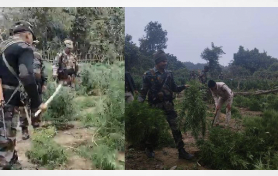The Jatrapur police in Tripura recently destroyed a massive haul of 40,000 ganja (cannabis) plants in the South Nidaya Manaititta area. The operation, which took place in the remote, densely forested region, is part of the state’s ongoing efforts to tackle the rampant production and trade of illicit drugs that have been affecting the local communities, especially the youth.
Uncovering the Illegal Plantation
The destruction of the ganja plants marks a major victory for law enforcement agencies in Tripura, where drug abuse has been an escalating concern in recent years. The illicit cultivation of ganja in the hilly and inaccessible areas of the state has been one of the most pressing issues for local authorities. The South Nidaya Manaititta area, known for its rugged terrain and dense forest cover, has long been a hotspot for illegal drug cultivation, often hidden from public view and law enforcement agencies.
The breakthrough came when the Jatrapur police, acting on a tip-off, launched a well-coordinated raid in the area. Their efforts were supported by local intelligence, which revealed that a large-scale cannabis plantation had been established by local criminals involved in the narcotics trade. Once the police reached the site, they discovered over 40,000 fully-grown ganja plants spread over several acres of land.
The plants, which were being cultivated covertly by local cultivators, had reached maturity, and many of them were already ready for harvesting. In their raid, the police not only destroyed the plants but also dismantled makeshift huts and temporary shelters used by those involved in the illegal cultivation. The operation was carried out under the direct supervision of senior police officers, ensuring that every part of the plantation was eradicated.
The Rising Threat of Ganja Cultivation in Tripura
The destruction of the 40,000 ganja plants highlights the increasing challenges faced by Tripura in controlling the illegal drug trade. Cannabis cultivation has been thriving in several parts of the state due to the ideal climatic conditions for its growth and the remote locations where it can be easily hidden from the authorities. Many cultivators involved in this illicit trade belong to economically disadvantaged backgrounds and are lured by the high profits that the sale of ganja offers.
The problem has become so widespread that it has begun to affect not only the local communities but also the broader social fabric of Tripura. With its growing influence in the drug trade, cannabis has found its way into schools and colleges, where young students are becoming increasingly vulnerable to substance abuse. Many young people, seeking a quick escape from stress or peer pressure, are being introduced to drugs, which often leads to long-term addiction and other serious health problems.
Furthermore, the trade of ganja is fueling other criminal activities in the region, including trafficking, smuggling, and organized crime. This makes it even more crucial for law enforcement agencies to take strong and decisive action to prevent further growth of this illegal industry.
Community Support and Law Enforcement Cooperation
The operation carried out by the Jatrapur police is part of a broader strategy by the Tripura government to intensify its crackdown on drug-related activities across the state. The state’s police force has been working closely with local communities, village councils, and various non-governmental organizations (NGOs) to raise awareness about the dangers of drug cultivation and abuse.
One of the significant challenges in addressing drug issues in Tripura is the involvement of local farmers, who, often due to lack of livelihood options, resort to cultivating ganja as a cash crop. To effectively curb this practice, the state government has started programs aimed at offering alternative livelihood options to these farmers. By providing financial support, agricultural training, and access to government welfare schemes, the authorities hope to steer farmers away from illegal drug cultivation and encourage them to engage in more sustainable and legal farming practices.
In addition to this, the state has also ramped up surveillance and intelligence gathering to detect illegal drug plantations in remote areas. The recent operation in South Nidaya Manaititta is a result of this enhanced vigilance. The Jatrapur police, along with other law enforcement agencies, are actively collaborating to ensure that illegal drug trade networks are broken down.
A Step Toward a Safer Tripura
The destruction of the 40,000 ganja plants is a significant achievement in Tripura’s fight against drug abuse and trafficking. It serves as a clear message to those involved in the illegal drug trade that law enforcement is determined to eradicate drug cultivation in the state.
While the authorities’ efforts are commendable, the issue of drug abuse and illegal cultivation requires a long-term, multi-pronged approach that includes education, community support, law enforcement, and alternative livelihoods. The recent operation is just one of many steps that will be needed to ensure that Tripura becomes a safer, drug-free state for future generations.
As the state continues to make strides in curbing drug-related crimes, the collaboration between law enforcement, local communities, and the government will be crucial in creating a holistic and sustainable solution to the growing problem of drug abuse in Tripura.




















